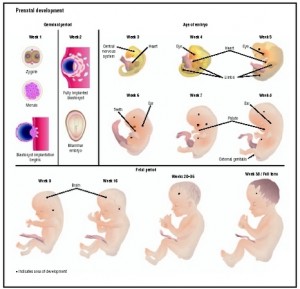Prenatal Nutrition
Filed under: General Health, Nutrition
I recently had a comment from a reader on one of my recent posts on cancer prevention asking this:
“On the topic of exposure to harmful chemicals/substances etc, – have you ever written on prenatal nutrition for those who are looking to have children? Also, what to do to minimize exposure to harmful substances while pregnant? Perhaps some general guidelines for healthy eating during pregnancy? I think that would be an interesting topic.”
While I don’t think this topic can be sufficiently covered by a blog post I am certainly happy to provide some general guidelines for healthy eating during pregnancy. I will also point out that my good friend and colleague Cassandra Forsythe has written extensively about nutrition and training during pregnancy on her site, and I highly recommend you check that out if this is something you are truly interested in learning a lot about.
To start I don’t think the general principles of good nutrition change all that much during pregnancy besides the fact that many women find it difficult to smell or consume a lot of foods they normally like in the first trimester (and sometimes throughout the entire pregnancy). This particular issue can be a challenge, but do realize that it is mostly temporary. For example my wife really struggled to keep food down and was simply not interested in eggs and other meals we used to eat on a regular basis. For a while she was really relying on cereal with some cold milk (full-fat, grass-fed of course) because it was simply all she could keep down. After a few weeks she was able to slowly get back to “normal” eating so it really wasn’t a big deal. Again, it is just important to remember that this stage is usually temporary. If it persists you should certainly discuss this with your doctor or midwife.

Having said that, some of my simple tips would be as follows.
1. Eat mostly real, whole, minimally processed food.
2. Eat food as close to its natural state as possible.
3. Eat 3-6x/day (whichever style fits your schedule and allows you to keep food down)
4. Eat a mixture of quality protein, healthy fats and whole carbohydrates.
5. Eat at least 1 serving of fruits and/or vegetables every time you eat.
A lot of people think that becoming pregnant means you are now “eating for two” and unfortunately it is sometimes used as an excuse to pound donuts and cake. To me that is just sad. What you eat is essentially providing the building blocks for the growth of your child, and you are choosing to provide donuts? You should be aiming to provide your baby with a nutrient dense diet that contains a nice combination of protein, healthy fats, and whole carbohydrates. This is not the time to start a low-carb or low-fat eating regimen, period. In addition, while healthy weight gain is encouraged the recommended ranges of gain are not as high as some would believe. While you should always discuss this kind of stuff with your care provider, in general here are the usual recommendations:
- Underweight women: 28-40lbs
- Normal weight women: 25-35lbs
- Overweight women: 15-25lbs
In general, you should gain about 2 to 4 pounds during your first trimester and then 1 pound a week for the remainder of your pregnancy. In order to do this you only need to consume an additional ~350kcal per day on average. It is actually less in the first trimester, as you are only gaining 2-4lbs in three months, and increases as you and the baby both grow. It is also interesting to note where that weight goes:
- Baby: 8lbs
- Placenta: 2-3lbs
- Amniotic fluid: 2-3lbs
- Breast tissue: 2-3lbs
- Blood supply: 4lbs
- Fat stores: 5-9lbs
- Uterus: 2-5lbs
- Total: 25-35lbs

As for specific foods to consume that is a tough one because people have different needs and likes, but in general whole eggs are a nutritient powerhouse and provide a tremendouse source of choline (which 90% of the US population is deficient in) that is essential for proper fetal brain growth. A nice blend of high quality plant and animal products is always a good way to go. In general if you follow my usual nutrition recommendations your intake should help facilitate a beautiful and healthy pregnancy.
As for supplements and prenatals I will make some recommendations but I do want to point out these are simply broad recommendations and any supplement you add should be discussed with your care provider to ensure it is right for you. There are a lot of options but I do still like Women’s One Daily by Innate Response. It is affordable, is truly whole-food based and also provides 800mcg of folate (rather than folic acid, which I prefer). While it doesn’t contain adequate iron (as it isn’t truly a prenatal) you can add 10mg of iron as an additional supplement to better meet your increased needs. Fish oil is also beneficial to women, and as per my usual 1tsp per day of Carlson’s The Very Finest Fish Oil is a good way to go. In my opinion pregnant women should also get their vitamin D levels tested to ensure adequate levels for proper fetal development. In addition, if you plan to breastfeed there is some interesting preliminary data showing that with adequate vitamin D levels (achieved through supplementation) women were able to provide sufficient vitamin D through their breast milk to their baby. I generally recommend 2,000IU per day, but I would again encourage you to discuss this with you care provider. Probiotics are generally a good idea as well, as is supplementing with additional choline if you feel your intake is inadequate.
Something to look into though I am hesitant to provide even a general guideline on is vitamin K2-MK4. Stephan Guyenet has written extensively about this, and you can check out his entire Malocclusion series that outlines the potential importance of this nutrient in fetal development right here.
I want to stress again that these are just general guidelines, and all specifics should be addressed with your care provider to make sure they are right for you.
As for avoiding chemical pollutants and minimizing exposure to harmful chemicals I think that following my recommendations in these previous posts will make a world of difference:
- How to Use Less Plastic
- Should You Filter Your Drinking Water?
- Dangers and Solutions of Indoor Air Pollution
I hope that helps! Please feel free to chime in or ask any questions.
Check out the BSP Training & Nutrition Newsletter!
You will get immediate access to:
- Weekly updates and exclusive content.
- The 20-page report "The Truth About Saturated Fat & Cholesterol."
- Become more awesome!
Posted on December 28th, 2011 by Brian St. Pierre
2 Comments




January 23rd, 2012 at 9:21 pm
Awesome Brian!
November 12th, 2012 at 2:37 pm
I wanna comment that you have a excellent site, I really like the design and style it really stands apart.